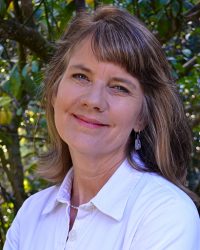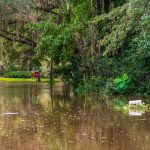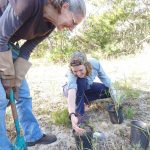Environmental Journalism: ““The demand is finally there from the profession. And, many of our students are fired up to cover the story.”
This profile originally appeared in the College’s 2024 Dean’s Report.

Cynthia Barnett, CJC’s director of Climate and Environment Reporting Initiatives, says many students in her classes see climate change and what’s happening to the planet as the story of their generation. She’s training future environmental journalists to ensure they are prepared to cover it with captivating storytelling, scientific accuracy and an eye toward solutions.
“For too long, environment and climate coverage were considered esoteric. Now, every national outlet has a major desk devoted to the environment and climate change,” she said. “The demand is finally there from the profession. And, many of our students are fired up to cover the story.”
Barnett joined CJC in 2015 as a Hearst Visiting Professional, a one-year stint to teach environmental journalism and develop a syllabus to weigh interest. Eight years later, she’s moved into her new director’s role, which includes developing student immersion opportunities in the Innovation News Center and internationally, and building partnerships for the college and WUFT News.
That includes the college’s new Florida Environment & Ag Desk devoted to covering the environment, climate, farming and rural issues statewide. In December, Report for America awarded WUFT the desk’s first full-time reporting position.
“Coming off the hottest summer in recorded history, warming is an especially urgent story,” Barnett said. “UF, as the flagship university in a state that’s the most vulnerable in the nation to climate change, should be a leader on this issue, not only in our College but across the 16 colleges.”
Barnett teaches Environmental Journalism each fall and Advanced Science, Environment & Health Reporting in the spring, often around published projects like WATERSHED, which won the college’s first Online News Association Student Journalism Award last year.
“Students fanned out all over Florida to report these very rich stories about water quality for the 50th anniversary of the Clean Water Act,” she said. “Part of the idea was to help them learn about the seemingly intractable environmental problems we’ve solved in the past, which gives them hope for the future.”
Barnett also helped found the college’s annual Climate Communications Summit, now in its ninth year, which includes climate training for student and professional journalists. One of the trainers this year – CJC alumna Alex Harris, lead climate change reporter at The Miami Herald – was a student in Barnett’s first “EJUF” class in 2015.
“Today, our students can land full-time environment reporting jobs right out of college, which wasn’t possible even a few years ago,” said Barnett, a CJC alumna who is also the author of four popular books on the environment. “It’s great to see the profession catch up to this generation’s passions and talents and the world’s great needs.”
Category: Environmental News
Tagged: Cynthia Barnett Environmental Journalism
Subscribe to our News Digest


